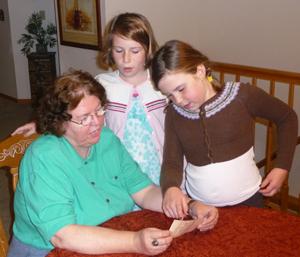
Joyce Kurtz Leu, a former member of St. Mary Parish in Fairfield who now lives in Marion, Iowa, has fond memories of her old parish. “I grew up believing God hovered like a helicopter over the corner of Third and Grimes (where the church is located). It was hard to leave that parish.”
But she and her husband moved five years ago to be closer to their son and granddaughters.
While going through memorabilia, she found a 66-year-old ticket for a fall festival at the former St. Joseph Parish in East Pleasant Plain. Her father, who died years ago, had purchased the ticket five years before she was born. “I’m the daughter of a man who saved things,” she explained. The fine print on the ticket described many details about the festival.
“We’re big history buffs from way back,” added Joyce, who did research on the Internet to get a better sense of the value and importance of the items to the parishioners participating in the festival. She submitted her findings in a letter to the editor of the Fairfield newspaper and agreed to share it with The Catholic Messenger as well. Exerpts from her letter are printed below:
We recently uncovered a ticket purchased for $0.10 for the drawing held at “St. Joseph’s, East Pleasant Plain, Evening of Labor Day, Monday Sept. 6, 1943.” The ticket advised that supper was being served from 5-8 with “entertainment during evening.” The reverse of the ticket listed the items for the drawing and that list provided an interesting snapshot of the basics for a Jefferson County lifestyle from 66 years ago, along with information about what merchants were operating in the small towns of Jefferson County.
Donations included, from E.D. Wittmer of Germanville, a 49-pound sack of flour.
From Fairfield, Shriner & Johnson (pharmacy) donated a package of “Lec’s Tonax.” (A Google search finds no usable information about Tonax but I’ll bet that since it came from a drugstore it was something really fun!) Also from Fairfield was Billeter Motor Co. donating 10 quarts of oil and a “lubr & wash” job. Dr. George donated $3 cash.
From Richland, Horning & Bennett donated 10 lbs of grease, Dressler’s Groc donated 49 lbs of Certainty flour and Union State Bank donated $5 cash, as did Frank Maher.
From East Pleasant Plain and Pleasant Plain $5 cash was donated by Groups 1, 2, 3 and 4 of St. Joseph Church, by the pastor (Father Wetzstein) and by Henry Pickard and Son. William Deutsch donated $3 cash. Isadore Deutsch Sr. donated 6 gallons of gas while the J.C. Supalla Service Station donated 10 gallons of gas. … Karl Harken donated 5 prizes, each consisting of 10 pounds of lard.
Clark’s store offered both a 49 lb sack of flour and a ladies’ dress pattern & mat.(erial). Wanerus Market offered a “meat order.”
Shelangoski Bros. and Dr. M.L. McCreedy each offered $5 cash while Rubio Savings Bank of Brighton offered a $5 savings account. Charles Drish donated a gallon of floor wax. Frank Hoskins donated an end table. Jeanne’s Nic-Nac Shoppe donated a “pr. of plaques.”
In 1943, bread was selling for $0.09/loaf, milk for $0.62 per gallon, eggs for $0.62 per dozen and gas cost $0.21 per gallon. The price of a new car was about $1,100, while a house might be had for $8,000. The average annual income in America in 1943 was $2,561 with a legal minimum wage of $0.30/hr.
It would be interesting to know why the flour was sold in 49-pound sacks, how the membership of the various groups at the church was derived (probably not alphabetically – if so, some groups might have been made up of mostly members of one extended family), and what was the value of Tonax!








